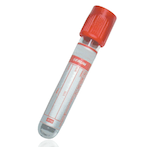Suitable Specimen Types
- Serum
Specimen Transport
First class post.Samples are sent to the Security Office in the foyer of the Medical School Vincent Drive - labelled for attention of Dr Davies Pharmacology
Sample Processing in Laboratory
UsualSample Preparation
Centrifuge sample and separate serumTurnaround Time
VariableSample Stability
4 ºCTaurine
General Information
Taurine or 2-aminoethanesulfonic acid is an organic acid. It has several physiological functions, e.g. in bile acid formation, as an osmolyte by cell volume regulation, in the heart, in the retina, in the formation of N-chlorotaurine by reaction with hypochlorous acid in leucocytes, and possibly for intracellular scavenging of carbonyl groups. Several links can be established between altered taurine metabolism and the development of cellular dysfunctions in diabetes which cause the clinical complications observed in diabetes, e.g. retinopathy, neuropathy, nephropathy, cardiomyopathy, platelet aggregation, endothelial dysfunction and atherosclerosis.
Patient Preparation
None
Notes
Glycated Haemoglobin (HbA1c) is also requested on an EDTA sample (done at BHH).
Reference Range
Povided by reference laboratory
Specifications
- EQA Scheme?: No
